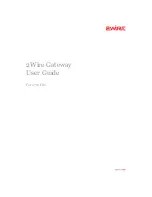
Crestron
CEN-RFGW-EX
infiNET EX™ Gateway
Appendix B: Optimum RF Reception Guidelines
Many factors can affect the reliability of RF communication between an
RF gateway and an RF device. While an effort has been made to
determine operating specifications, some specifications are not constant.
RF Communication can be limited by several factors including but not
limited to EMI (electromagnetic interference), intervening objects,
antenna orientation and receiver placement. To obtain maximum
reliability and performance, some basic rules for installing RF
transceivers are listed below.
Minimize Interference
RF reception range can be hindered by spurious EMI noise that may
interfere with or mask the desired frequency, thereby reducing useable
range. EMI is generated by any electrical device at various RF noise
levels depending on the device. Sources of EMI include computers, video
equipment, digital processors, lighting dimmers, lighting ballasts, motors
or any large AC source. Every effort should be made to separate any RF
transceiver from these sources of RF noise including Audio Visual
equipment in racks. If a gateway must be installed in an equipment rack,
make sure you have ample separation between the equipment and the
gateway.
Gateway Placement
Optimum reception for any RF transceiver is obtained by installing the
gateway transceiver in an open area or shelf with a clear line of sight (no
obstructions between gateway and receiver). Crestron recommends that
the gateway is at least five to six feet high for best results. Avoid placing
transceivers or transmitters at a low height or on the ground. Placing RF
equipment near metal objects, walls, corners or metal enclosures will
compromise RF propagation and reception. Try to avoid installing
gateways in equipment racks, service rooms, electrical closets or in
rooms other than that which the panel is located.
Operations & Installation Guide – DOC. 6706A
infiNET EX™ Gateway: CEN-RFGW-EX
•
31






































